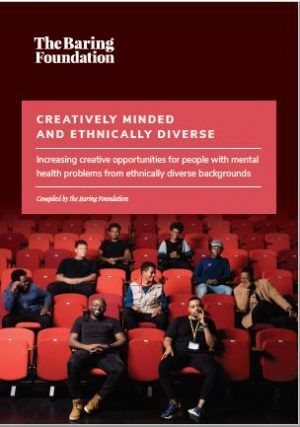We have this week announced 13 grants as a result of the applications we got for a round of funding for Global Majority led arts organisations. As I did for our open round last year, I want to explain our thinking behind these decisions.
Firstly, why did we run this round? Early on in our research for this programme it became clear that there were relatively few practitioners from ethnically diverse communities working in the arts and mental health field. This was further substantiated by our report Creatively Minded and Ethnically Diverse. This shone a light on under-representation from African, Afro-Caribbean and Asian communities in particular.
Last year we took a step towards addressing this through an open round which elicited 143 applications from arts organisations with a commitment to anti-racist practice and with experience of working with people with mental health problems. We gave grants to 25 of these and noted that a minority were led by People of Colour.
This year we went further in our new round by requiring the arts organisations to be Global Majority led (which we defined) but we did not require experience of working with people with mental health problems. Therefore, these grants can offer a bridge into this work for new entrants as well as extending work beyond organisations already working in this way.
The term ‘Global Majority’ is a relatively new one and does not have an ‘official’ definition, but it seeks to be a positive framing: rather than viewing people with a heritage from Africa, Asia or Latin America as minorities, instead seeing that Globally they are in a Majority. As we explained in our guidance, in choosing it, we were indicating that we wanted to tackle the under-representation of artists from some communities. We know that language is a difficult subject when it comes to ethnicity, with a variety of views. As in 2021, we held information sessions online to explain our thinking and the application process.
We received 79 applications worth £3,656,901. We had indicated that we would be spending at least £500,000 on this round.
Bids were assessed strictly against the published criteria for the fund. This meant that we have selected those applications that most closely met those criteria. Making grant decisions is not a science and often a matter of judgement. Importantly, it is comparative; some organisations that we have, sadly, not been able to fund, will have met some, most or even all the criteria, but in our view, less well overall than those we have selected. Applications were independently assessed by two staff members and by our two Arts Advisers, Daniel Regan and Sabra Khan, who jointly made recommendations. These were the reviewed by our Committee of five Trustees who saw all applications.
We have a strict conflict of interest rule which means that no trustee, staff member or adviser can play any part in a grant assessment where they have a conflict of interest. This rule is applied rigorously.
We awarded grants to 13 applications with a value of £670,338. We know that the unsuccessful applicants will be disappointed and regret that we can’t support their bids this time. However, we are committed to continuing to fund in this area for a long time to come and there will be further opportunities for funding.
In thinking about our guidance for this round and how we can improve it the future, we have concluded that we need to be even clearer about what we are not funding as well as what we are funding. So, we are not funding Creative Arts Therapies or work with people with neurological issues such as dementia, or neurodiverse people or people with learning disabilities. This is already implied by saying we fund participatory arts activity with people with mental health problems.
I am delighted that we now have a total portfolio of 38 organisations actively seeking to improve ethnic diversity among arts organisations working in this area. We are already seeing exciting results as well as noting interest by other funders. The 13 new organisations will reach different communities and bring fresh ideas to play as their work gets under way. We will keep you informed as the work bears fruit.
